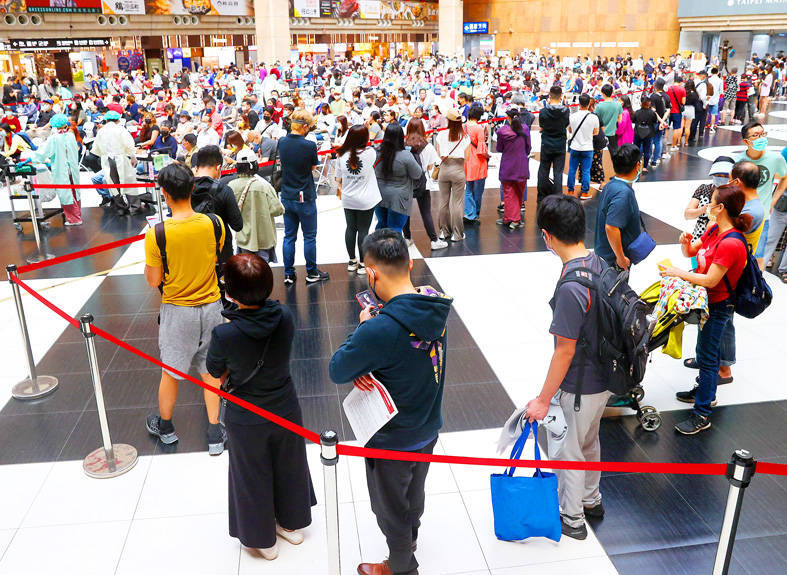《TAIPEI TIMES》 CECC tweaks its quarantine testing rules

People line up for a COVID-19 vaccination in the main hall of Taipei Railway Station yesterday. Photo: CNA
PREDICTION: Chen Shih-chung said it is possible that the daily domestic case count would rise to more than 1,000 infections a day by the end of this month
By Lee I-chia / Staff reporter
The COVID-19 test required for ending home quarantine or isolation has been changed to an at-home rapid test, effective immediately, the Central Epidemic Command Center (CECC) announced yesterday, as it reported 551 new domestic infections.
Centers for Disease Control (CDC) Deputy Director-General Chuang Jen-hsiang (莊人祥), the CECC’s spokesman, said that as the number of domestic COVID-19 cases is continuing to rise, the polymerase chain reaction (PCR) test previously required upon ending home quarantine or isolation would be replaced by an at-home rapid test for increased efficiency.
He said the specificity of at-home rapid tests is as high as 99 percent, they are effective in detecting infected people who are contagious and they can be easily performed, removing the cost of transporting people to a hospital for a PCR test, as well as reducing the infection risk.
Therefore, a person in home quarantine or isolation should perform an at-home rapid test on the final day of quarantine or isolation, report the result and be released if they test negative, Chuang said.
People need to be tested twice during the 10 days of isolation — between the fifth and seventh day, and on the final day — and twice in the following seven days of self-health management — on the second and fourth days.
People under home quarantine would no longer need to take an at-home rapid test on the seventh day, Chuang said, adding that they need to take a rapid test on the third, fifth and final day of quarantine, and on the second and fourth day of self-health management.
He said people who are in isolation or quarantine and do not have a rapid test kit for the final day can use the test kits originally reserved for self-health management and later contact their local government to receive an extra kit for use during self-health management.
Meanwhile, Chuang said 551 new domestic COVID-19 infections and 112 imported infections were reported yesterday.
The domestic infections are 162 cases in New Taipei City, 115 cases in Taipei, 61 cases in Kaohsiung, 53 cases in Taoyuan, 37 cases in Keelung, 31 cases in Hualien County, 26 cases in Taichung, 16 cases in Hsinchu County, 14 cases in Pingtung County, and one to nine cases in eight other counties and cities.
No new moderate-to-severe cases were confirmed yesterday, and 99.66 percent of the 4,415 domestic cases reported this year were mildly symptomatic or asymptomatic, he said.
Chuang encouraged people to download the Taiwan Social Distancing (臺灣社交距離) app on their smartphone to improve the efficiency of contact tracing.
CECC Information Management Division head Jian Hong-wei (簡宏偉) said users only need to download the app and turn on Bluetooth, adding that they do not need to register any personal information and that it does not collect any personal data from users, but will inform them if they recently had close contact with a confirmed COVID-19 case.
The app has been downloaded 6.89 million times and 83 percent of confirmed cases had uploaded data to the app, he said, adding that the goal is to reach 13 million users — about 60 percent of the population, or 80 percent of the population aged between 15 and 65 — for the app to be more effective.
The center encourages people who visit public venues or events — such as going to a restaurant, market, pilgrimage or concert — to download the app first, Chuang said, adding that it would replace the contact tracing QR codes in the future, but it is not suggested for places where people stay for less than two minutes.
Separately, Minister of Health and Welfare Chen Shih-chung (陳時中), who heads the center, said in a radio interview yesterday morning it is possible that the daily domestic case count would rise to more than 1,000 infections per day by the end of this month, and that the higher risk areas include Taipei, New Taipei City, Taoyuan and Keelung.
Chen said that the four cities could submit plans to the CECC if they want to carry out testing in relatively high-risk areas, and that 200,000 at-home rapid test kits could be offered for each approved testing program.
新聞來源:TAIPEI TIMES
















